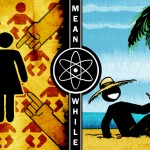As the Republican nomination devolves into the mud-slinging match we always knew it would become, it is instructive to observe the differing opinions about personal history and what personal history means for the future. In the course of this primary, we have had the following suggested to us by various characters in the drama:
-If you made a lot of money and obeyed government tax law, that reflects negatively on your candidacy.
-If a gigantic company paid you money to give them advice about maneuvering in governmental circles, and that company later needed a bailout because they followed the same bad business practices everybody else was following, that reflects negatively on your candidacy.
-If you cheated on your wife–well, two of your wives–that reflects negatively on your candidacy.
-If you get angry about people questioning you for cheating on your past two wives, that reflects positively on your candidacy.
-If you think each problem is new and should be thought about in a somewhat different way each time, that reflects negatively on you.
-If you fired someone, ever, that reflects negatively on your candidacy.
-It is bad to be a successful businessperson.
-It is bad to be a career politician.
-If you were a successful businessperson who then became a successful career politician, that’s bad.
-If you are angry at the media, angry at your fellow candidates, and angry at your party leadership, that reflects so positively on you that you might just be a frontrunner.
I’ve heard it suggested recently that we are essentially made up of two things: our memories, and the predictions that our minds make on the basis of those memories. In many ways this is true of a presidential candidacy, as well. It takes on a character of its own, rooted in its history, its actions, and the collective predictions and expectations of those who vote for or against the candidate. Sometimes, like Obama, the storytelling power of a candidacy is so powerful it can’t help but fail to fully deliver. Other times, as in the case of Romney, even things that were once thought of as positive qualities are turned into negatives.
Too often we allow ourselves to be caught up in gut reactions, jerked here and there by the most recent or loudest argument. But wisdom would suggest that we carefully consider what a person’s history tells us about them, and that we choose someone for whom doing the right thing in the critical moment is a life pattern rather than unsubstantiated rhetoric.











